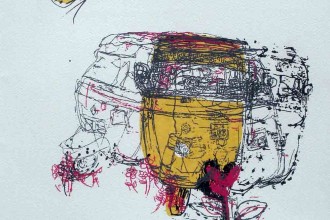
Strange World of Elderly People by Tassaduq Sohail. Image Courtesy: ArtChowk Gallery
‘Noritake-san? Wasn’t he discharged from the hospital last week?’
‘He told me his neighbour Nana-san was found dead in her house after a month because of the stink—rotting odour in the streets. Guess what smell?’
‘What?’
‘Iwashi!’ Abe-san cackled. ‘Apparently her corpse smelt like sardines.’
Waka-san leant towards us: ‘Guess there was a purpose for all those fishies that witch ate.’
‘Hag food. Ha-hah!’ howled Abe-san and Waka-san. I fidgeted in my wheelchair listening to their cough-punctuated laughter. Call me overly sensitive, but I couldn’t find it in myself, yet, to join in what I now perceived to be a daily ritual that kept them going. Laughter is indeed the best medicine, and I was staring at two fine specimens in their nineties serving as living proof. Being only seventy-three was a significant age gap; twenty more years before I could transform such absurdity into hilarity. I had a lot to learn.
‘Yuki-chan, what’s wrong?’
I mustered a grin, and judging by their quick turn of conversation—this time about some lady who couldn’t control her bowel movements (cue laughter; maturity clearly didn’t correlate with a disgust for potty humour)—it was enough to assuage their suspicion; solidarity kept intact.
‘Masa-san! What are you doing over there, alone? Come join us!’
I glanced over at the man—face wrinkled like an umeboshi, head covered in glorious white—fingering the shÅgi pieces in the corner with the optimal view of the garden. Masahiro Takayuki: oldest, at ninety-seven; longest residence, of nearly two decades; respected because of his seniority and admired for his patience, but also holding a reputation for being “unconventionalâ€, which I presumed was just a nicer alternative for “eccentricâ€. And he was irritatingly sympathetic to the youngsters who took care of us—those spoiled brats.
Just last week, a twenty-eight-year-old staff member who’d worked here six years was forced to leave because she’d abused poor, cancer-ridden Izumi-san. Even Abe-san had been uncharacteristically worried a few weeks ago, pointing out bruises on Izumi-san’s arms and her uneven loss of hair, millimetre-long follicles sprouting from cherry tomato spots that covered her scalp.
‘Izumi-chan! Looking beautiful with that wispy fluff! You’re almost as charming as Sadako!’ shouted Waka-san last Wednesday, only to jump in fright at the sound of Izumi-san crashing to the floor; her relentless shaking had thrown her cane off balance. By the time Waka-san waddled over in his oversized trousers that were slipping off—arms extended behind, wrists bent back and paddling the air like an awkward duck—Izumi-san had broken into tears, snot running into her mouth as she pounded her temples with her palms.
‘I’m ugly! Hideous! Like a witch! Better to be a yūrei, better to be a ghost like Sadako!’ she screeched, tearing at her hair and skin with sharp fingernails her carer hadn’t bothered to cut. Magmatic lines appeared faintly, blossoming into a bright, bold pink that quickly spouted a torrent of pent-up frustrations, manifesting in a bloody drip-drop. Waka-san searched his pockets for his snot-covered handkerchief, wiping away but not fast enough. Finally, Shinichi-kun, one of the better carers, came running with the first aid kit and pressed a gauze pad against the oozing streams as Waka-san held her hands tightly.
An immediate investigation and perusal of security camera footage revealed habitual hair-pulling and body-pummelling by her carer, along with demeaning accusations and mortifying insults. Komaeda Home for the Elderly blew up at this unprecedented occurrence; furious shouts were flung over dinner the other night, some even calling for the carer to be thrown into prison. But Masa-san’s voice had rung out clearly in the dining room: ‘Must be patient with them—still learning.’
Abe-san couldn’t restrain herself: ‘Bullshit! Izumi-san’s carer’s been here six years already! They’re cruel, fuck them all!’
Masa-san didn’t bat an eyelid. ‘They’re tired. Exhausted. Imagine having to mop up after yourself every day for six years.’
‘I’d probably strangle you in your sleep!’ piped Waka-san.
Abe-san hissed at Masa-san: ‘You give them the benefit of the doubt too much. It’s their job. And they’re doing it poorly.’
He stared off into the distance. ‘Must always give people the benefit of the doubt.’ And that was all he’d said for the rest of the night. Like I said, irritatingly sympathetic. “Unconventionalâ€.
‘Masa-san!’ Abe-san’s persistence finally caused him to abandon the shÅgi board and wheel over. In the moonlight he looked almost ethereal. We were sitting in the main common room, our neatly aligned wheelchairs forming an inward-facing semi-circle, while others lounged in sofa chairs, canes of varying shades of brown resting on their laps; a few even had IVs stuck in their puny, veiny arms, shuddering as they reached for gold generals on the board to dispatch flying chariots. The weak can only be strong through games of ruthless pretence; yet weak we still were. Through the windows, backyard foliage monitored our soon-to-be cadavers, watching us wilt away as they grew steadily and healthily, sighing oxygen in photosynthetic pity. Most of the residents were here; it was seven in the evening.
‘Masa-san! Yuki-chan hasn’t heard your stories before!’ The din dropped several notches in synchrony. I saw a few ears perk up in muted interest, some even coughing to cover up the sound of chairs scraping the floor for a better view—enough to pique my curiosity. He looked at me as I nodded reverently—the blessed recipient of an imperial secret about to be bestowed upon me by a hallowed sage.




